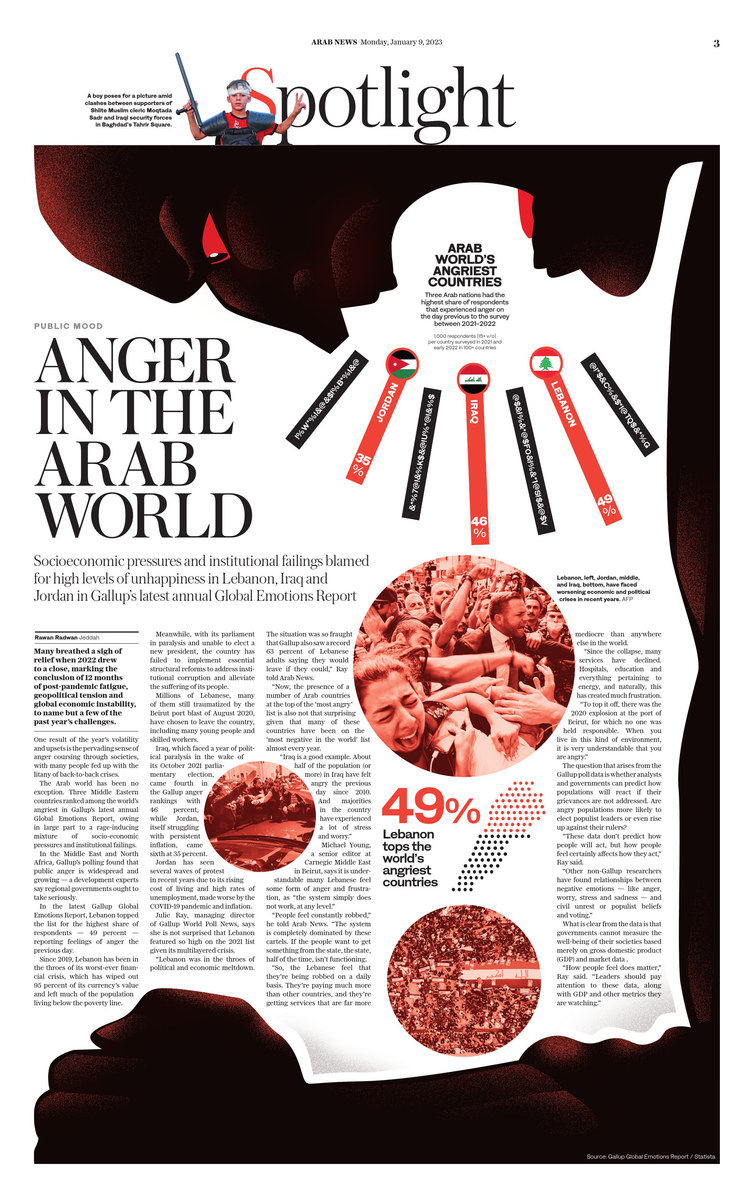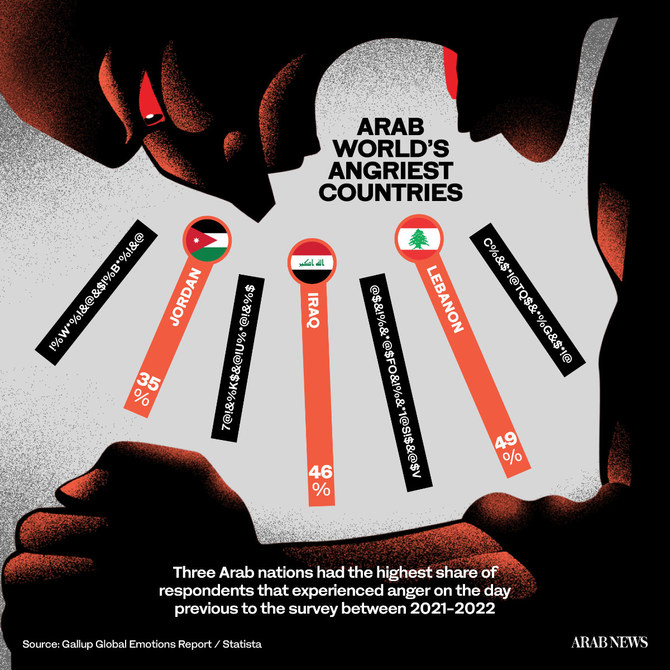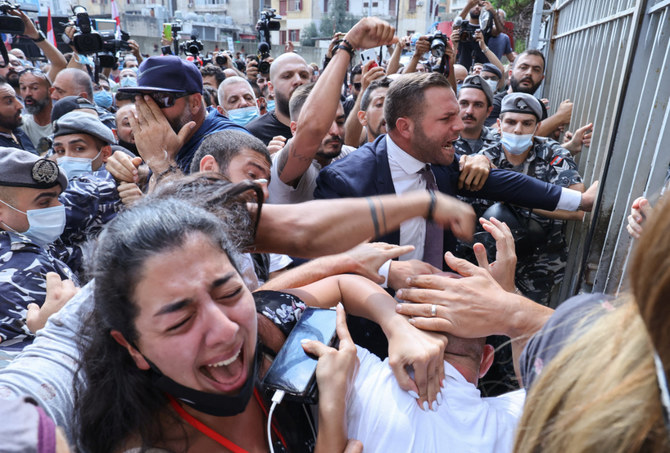JEDDAH: Many breathed a sigh of relief when 2022 drew to a close, marking the conclusion of 12 months of post-pandemic fatigue, geopolitical tension and global economic instability, to name but a few of the past year’s challenges.
One result of the year’s volatility and upsets is the pervading sense of anger coursing through societies, fed up with the litany of back-to-back crises — solutions for which appear to evade governments and global institutions.
The Arab world has been no exception. Three Middle Eastern countries ranked among the world’s angriest in Gallup’s latest annual Global Emotions Report, owing in large part to a rage-inducing mixture of socio-economic pressures and institutional failings.
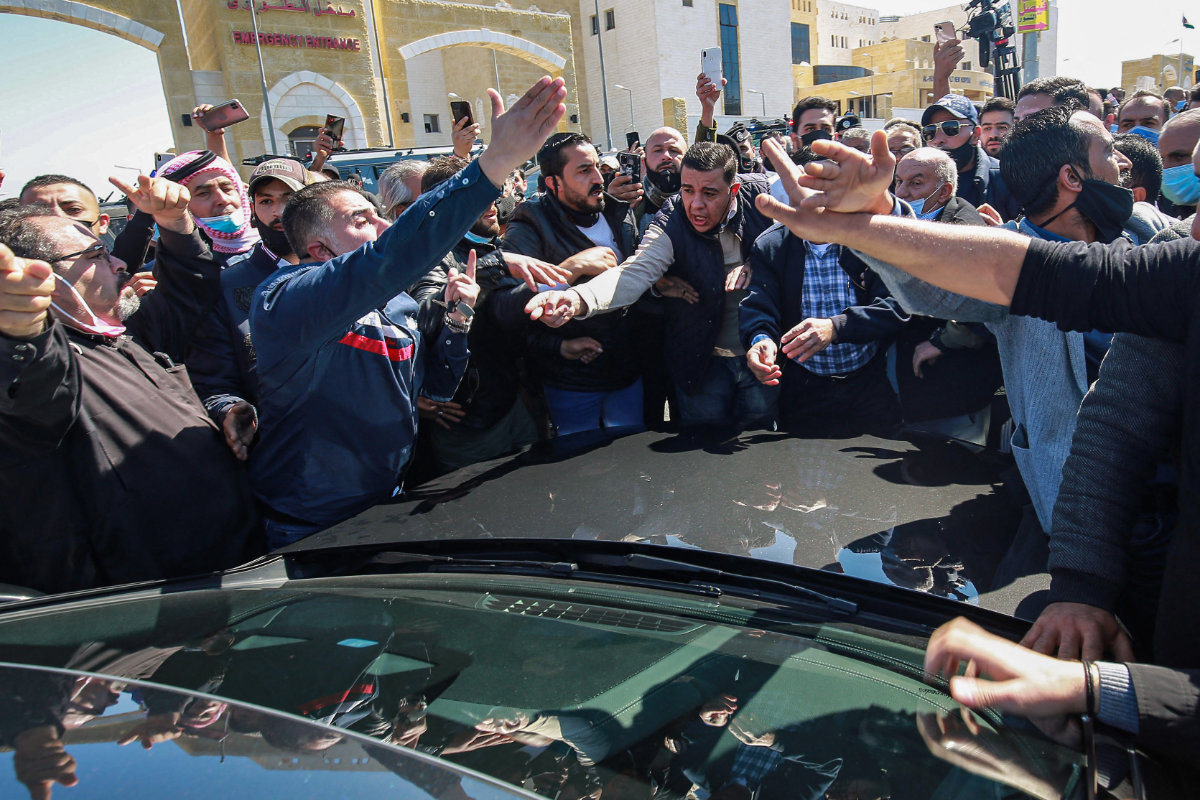
Angry Jordanians gather in the town of Salt on March 13, 2021 to protest the deaths of least six COVID-19 patients of a hospital that ran out of oxygen. (AFP file)
Just as the world economy appeared to be recovering from the lockdowns, supply-chain disruptions and travel bans of the COVID-19 pandemic, the war in Ukraine sent inflation spiralling, with rising food and fuel prices falling heavily on the world’s poorest.
Add to this the corrosive effects of political instability, corruption and suspected climate change, and the past year unsurprisingly proved to be a period of mounting anxiety, frayed tempers and violent unrest for millions worldwide.
In the Middle East and North Africa, where price fluctuations, climate shocks and protracted political crises have been keenly felt, Gallup’s polling found public anger is widespread and growing — a development experts say regional governments ought to take seriously.
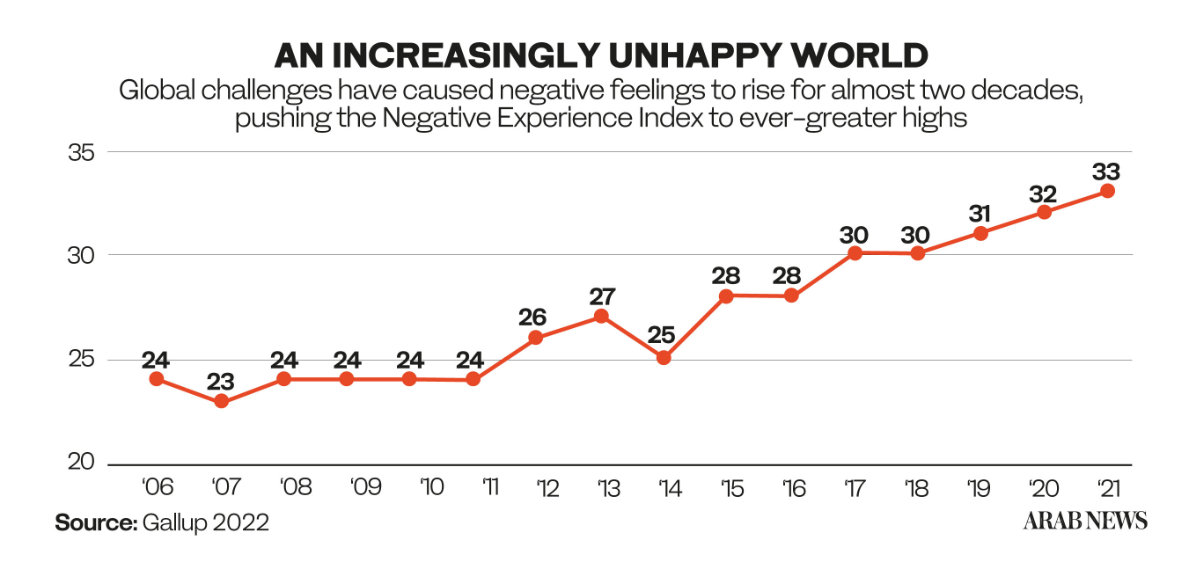
Gallup first began tracking global unhappiness in 2006 with a methodology based on nationally representative, probability-based samples among the adult population, aged 15 and above, collected from 122 countries.
It found that negative emotions — the aggregate of stress, sadness, anger, worry and physical pain — reached a record high last year, with 41 percent of adults globally saying they had experienced stress the previous day.
Furthermore, these negative emotions appear to be growing, with 2021 displacing 2020 as the most stressful year in recent history.
In the past decade, the Arab world has been roiled by mass protests, regime collapse, corruption, scandals, wars and mass migrations, disrupting regional priorities and internal dynamics.
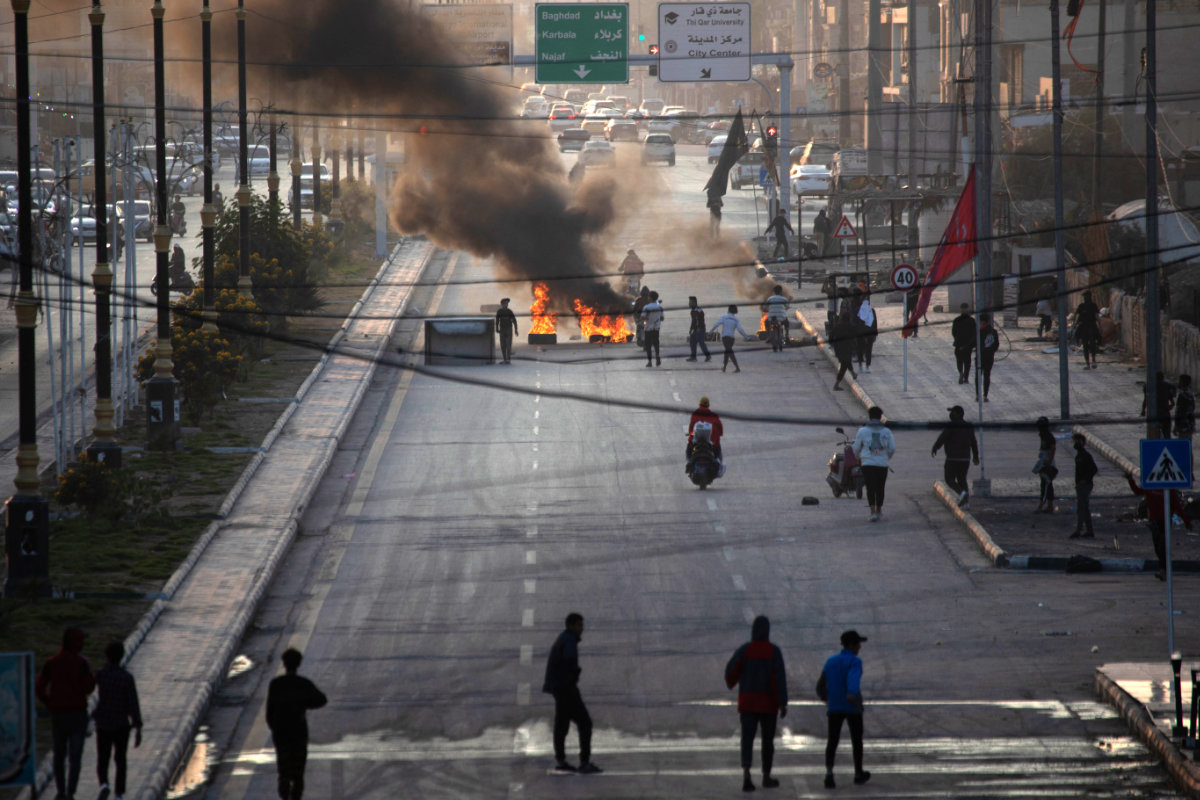
Iraqis block a road in the southern city of Nasiriyah on Dec. 11, 2022 to protest the death of fellow demonstrators in clashes with security forces. (AFP file)
In the latest Gallup Global Emotions Report, Lebanon topped the list for the highest share of respondents — 49 percent — reporting feelings of anger the previous day.
Since 2019, Lebanon has been in the throes of its worst-ever financial crisis, which has wiped 95 percent off the value of its currency and left much of the population subsisting below the poverty line.
Meanwhile, with its parliament in paralysis and unable to elect a new president, the country has failed to implement essential structural reforms to address institutional corruption and alleviate the suffering of its people.
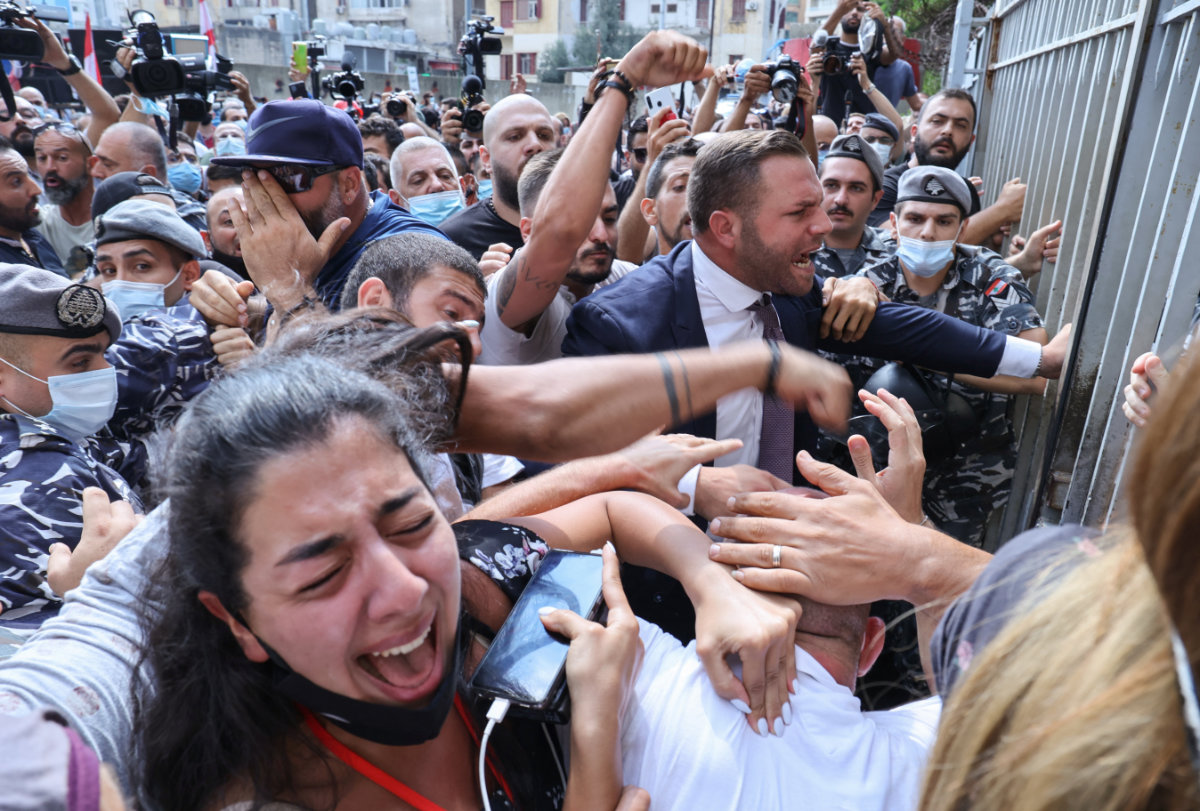
Activists and relatives of victims of the Beirut port explosion scuffle with security officers during a demonstration on Sept. 29, 2021 in the Lebanese capital. (AFP file)
Millions of Lebanese, many of them still traumatized by the Beirut port blast of August 2020, have chosen to leave the country, including many young people and skilled workers, fed up with poor conditions and a lack of opportunities.
Iraq, which faced a year of political paralysis in the wake of its October 2021 parliamentary election, came fourth in the Gallup anger rankings with 46 percent, while Jordan, itself struggling with persistent inflation, came sixth at 35 percent.
Jordan has seen several waves of protest in recent years due to its rising cost of living and high rates of unemployment, made worse by the COVID-19 pandemic and inflation.
FASTFACTS
Lebanon ranked 1st with 49% of respondents reporting feelings of anger the previous day.
Iraq, which faced a year of political paralysis following its 2021 election, came 4th with 46%.
Jordan, which is struggling with spiraling inflation and high unemployment, came 6th at 35%.
(Gallup Global Emotions Report)
Julie Ray, managing director of Gallup World Poll News, says she is not surprised that Lebanon featured so high on the 2021 list given its multilayered crisis.
“Lebanon was in the throes of political and economic meltdown. People were struggling to put food on their tables and taking to the streets. The situation was so fraught that Gallup also saw a record 63 percent of Lebanese adults saying they would leave if they could,” Ray told Arab News.

Julie Ray, managing director of Gallup World Poll Content. (Supplied)
“Now, the presence of a number of Arab countries at the top of the ‘most angry’ list is also not that surprising given that many of these countries have been on the ‘most negative in the world’ list almost every year.
“Iraq is a good example. About half of the population (or more) in Iraq have felt angry the previous day since 2010. And majorities in the country have experienced a lot of stress and worry.”
Michael Young, a senior editor at Carnegie Middle East in Beirut, says it is understandable many Lebanese feel some form of anger and frustration, as “the system simply does not work, at any level.”
“People feel constantly robbed,” he told Arab News. “The system is completely dominated by these cartels. If the people want to get something from the state, the state, half of the time, isn’t functioning.
“So, the Lebanese feel that they’re being robbed on a daily basis. They’re paying much more than other countries, and they’re getting services that are far more mediocre than anywhere else in the world.
“Since the collapse, many services have declined. Hospitals, education and everything pertaining to energy, and naturally, this has created much frustration. You had many people who were essentially middle-class people who suddenly found themselves in poverty.
“To top it off, the 2020 explosion at the port of Beirut, in which more than 200 people were killed, half of Beirut was destroyed, and no one was held responsible. When you live in this kind of environment, it is very understandable that you are angry.”
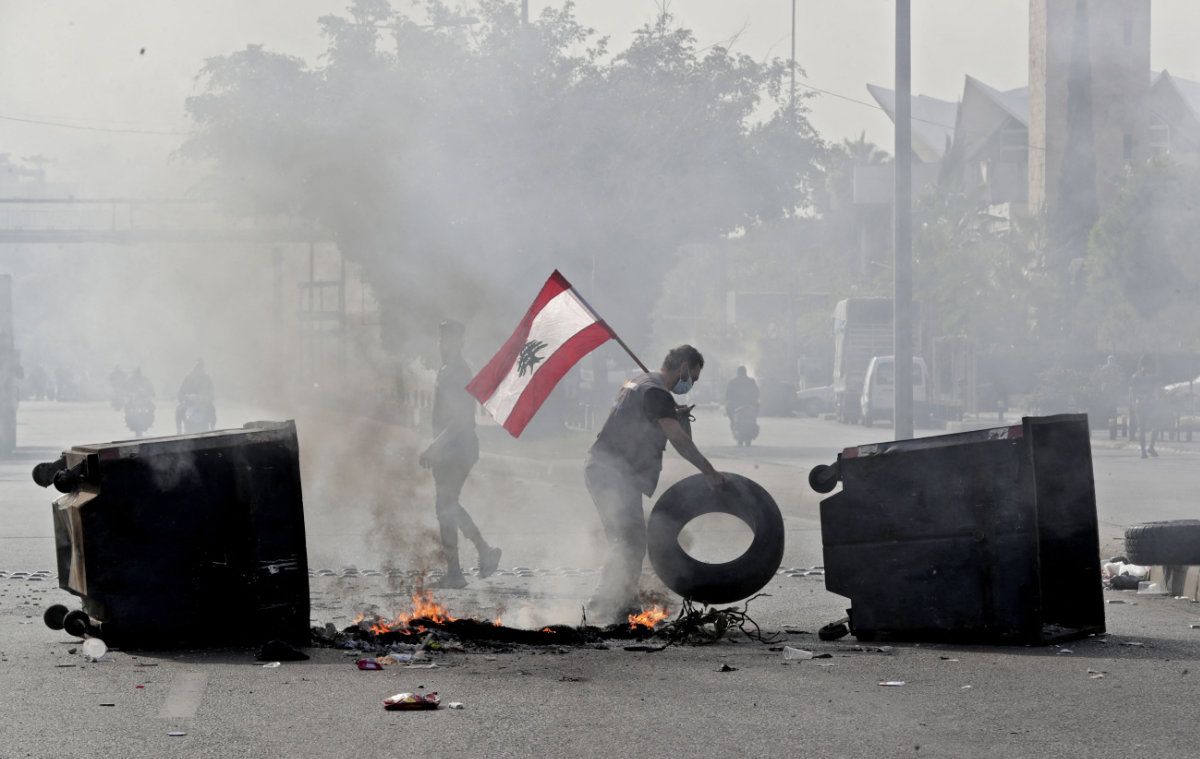
In this Nov. 29, 2021 photo, Lebanese protesters block a highway during a protest in Beirut as the country struggled with a deep economic crisis. (AFP)
This constant struggle has left many Lebanese feeling understandably frustrated. However, Young says that expectations play an important role in feelings of dissatisfaction.
Compare, for instance, a nation such as Lebanon — a middle-income country that has seen a sudden decline in services and political stability since 2019 — with the likes of Afghanistan, a poor country crippled by war for nearly half a century.
“When you have a nation like Afghanistan, where it’s been riddled with endless conflict and standards of living shooting down since the 1970s, (low expectations are) understandable,” Young told Arab News.
“If your expectations are high, and the reality is very short of these expectations, this will make you more angry than if your expectations are low and what you get in return is also relatively low.
“The question of expectations is a main generator of Lebanese frustration. The Lebanese were used to a life that suddenly, in one way or another, catastrophically collapsed.”
Afghanistan, which had been among the world’s most corrupt nations and which saw the Taliban return to power in August 2021, was ranked fifth angriest in Gallup’s poll at 41 percent.
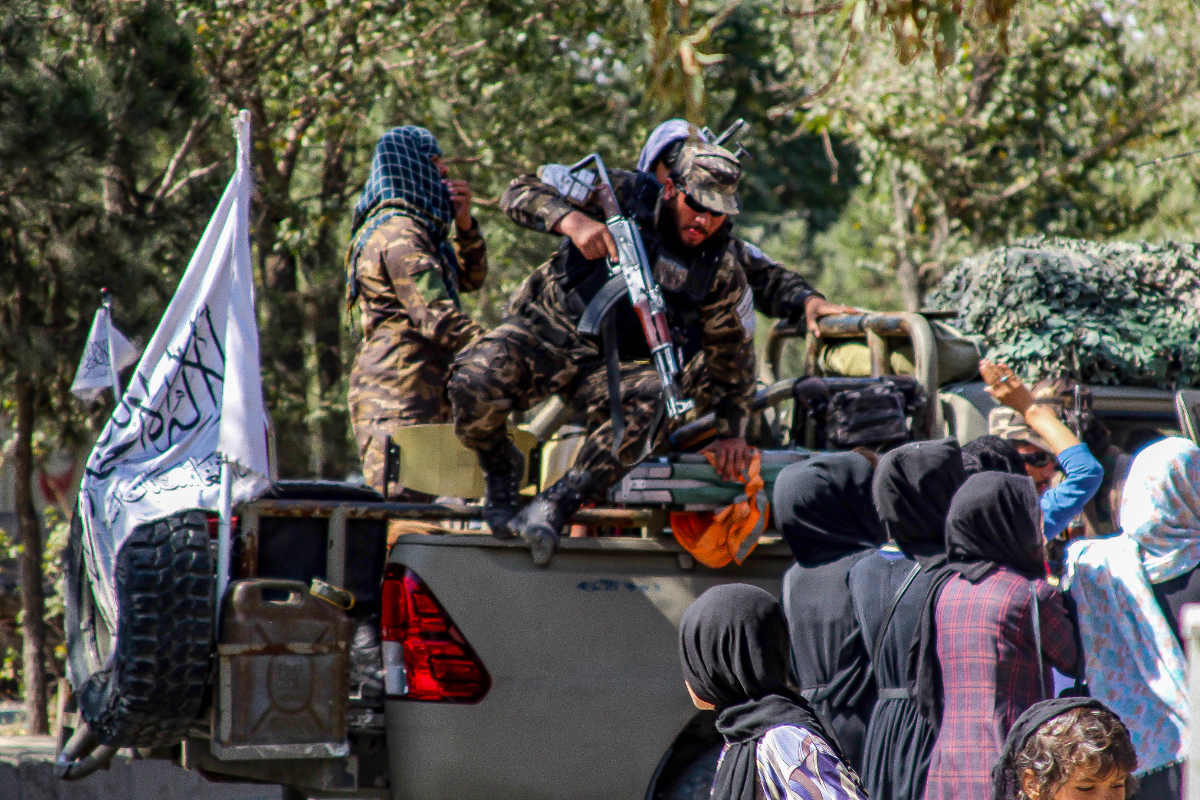
Taliban security forces arrive as Afghan women demonstrate against a suicide bomb attack on a school in in Kabul on Oct. 1, 2022, killing 20 people. (AFP)
In recent decades, reported negative emotions have been steadily rising in Gallup’s polling. The COVID-19 pandemic appears to have accentuated this trend. But, as Ray points out, “every country is different.”
“The common thread we tend to see in countries where negative experiences are high is crisis. The populations are all living through some sort of turmoil — be that economic, political or social.”
The question that arises from the data, however, is whether analysts and governments can predict how populations will react if their grievances are not addressed. Are angry populations more likely to elect populist leaders or even rise up against their rulers?
“These data don’t predict how people will act, but how people feel certainly affects how they act,” Ray said.
“Other non-Gallup researchers have found relationships between negative emotions — like anger, worry, stress and sadness — and civil unrest or populist beliefs and voting.”
What is clear from the data is that governments cannot measure the well-being of their societies based merely on gross domestic product and market data .
“How people feel does matter,” Ray said. “Leaders should pay attention to these data, along with GDP and other metrics they are watching.”
